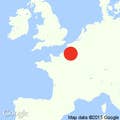
PARIS — None of the people standing on a bridge over Bassin de la Villette, a lake in Paris, were particularly happy Sunday.
The representatives of indigenous groups from around the world — the U.S., Ecuador, Brazil, a collection of island nations, and elsewhere — had arrived in Paris for the U.N. talks that aim to find a global solution to climate change.
However, demonstrators on the bridge said they are on the front lines of climate change but are being marginalized in the talks enter there second week here.
That frustrating combination — the impacts of climate change and the lack of a voice — came up again and again in conversations BuzzFeed News had with more than a dozen demonstrators.
Here are some of their comments:
Tom Goldtooth, of Minnesota, described an array of environmental changes that have impacted harvests and ceremonies.
Goldtooth is part of the Navajo, Dine', and Dakota tribes, and criticized the Paris talks for focusing on "market systems" for solutions.
Goldtooth's son, Dallas, later explained that the groups at the demonstration want the rights of indigenous groups explicitly protected in the final agreement, but that "some nation states have advocated for the removal of that text."
Felix Santi, of the Kichwa people in Ecuador, told BuzzFeed News through a translator that his people have experienced flooding, hail, and diminished harvests. Changing environmental conditions have also negatively impacted the relationship Santi's people have with their sacred beings.
Princess Daazhraii Johnson (left in the picture above), of the Gwich'in people in Alaska, told BuzzFeed News that pressure to develop tribal lands for oil drilling is coming from private industry and lawmakers.
Faith Gemmill (right), also of the Gwich'in, cited melting permafrost and massive wildfires as among the most series environmental challenges her people face.
Like others at the demonstration, Gemmill said that indigenous people's rights need to be protected in the final climate agreement.
"There's a lot of work that needs to be done this next week," she said.
Isso Nihmei, of Vanuatu, recalled seeing the island being hit by Cyclone Pam, which he said was one of the worst storms to ever hit the tiny nation. Contamination of freshwater supplies was a major struggle for residents.
Again, he also expressed frustration at the way indigenous peoples have been treated so far in the climate talks.
"The first week, we're not happy about it," Nihmei said.
Ashley Lucero lives on the Lummi Nation reservation in Bellingham, Washington. She said that one of the conflicts in the area involves efforts to transport coal via train.
Her community has been fighting the train for a year, she added.
And while Lucero said she was enjoying her time advocating in Paris, she was frustrated at how the process had gone during the first week.
"It looks like our rights are going to be cut," she said.

